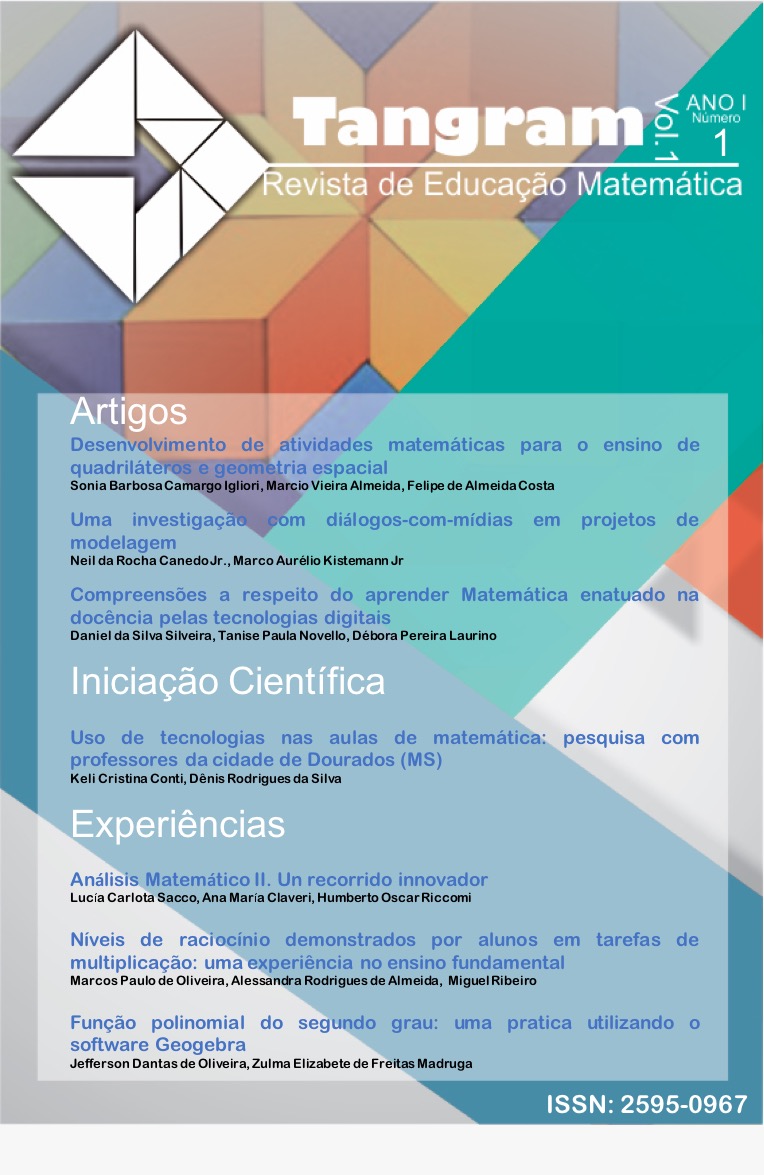Função polinomial do segundo grau: uma prática utilizando o <em>software</em> Geogebra
DOI:
https://doi.org/10.30612/tangram.v1i1.7359Abstract
Este artigo apresenta um relato de experiência de estágio que consistiu na aplicação de atividades envolvendo o software Geogebra em uma turma de 1º ano do Ensino Médio de uma escola pública do sul da Bahia. A prática objetivou desenvolver com os estudantes uma atividade investigativa de função polinomial do segundo grau. A realização se deu durante o horário de aula, por meio de uma oficina, onde os estudantes apresentaram para os colegas os gráficos elaborados no software. Ao final da oficina os estudantes manifestaram-se positivamente, dizendo que o software proporcionou uma melhor visualização e entendimento da representação gráfica das funções do 2º grau estudadas.
Downloads
References
BENITTI, F. Exploring the Educational Potential of Robotics in Schools: A Systematic Review. Universidade do Vale do Itajaí (UNIVALI), CTTMar, Programa de Pós-Graduação em Computação Aplicada, Rua Uruguai, 458, CP 360, 88302-202 Itajaí, SC, Brazil, 2012.
BROUSSEAU, G. Fondements et méthodes de la didactique des mathématiques. Recherche en didactique des mathématiques. Grenoble, v. 7, n. 2, p. 33-115, 1986.
COWPER, W. Exploring drag-mode geometry. In: Discovering Geometry with a computer – Using Cabri Géomètre. Heinz Schumann and David Green. Ed. Chartwell-Bratt, 1994.
JUNIOR, Raul. O Ensino a distância e as novas tecnologias. Revista Primus Vitam, n°5. 2013.
PAPERT, S. A Máquina das Crianças: Repensando a Escola na Era da Informática. Tradução de Sandra Costa. Porto Alegre: Artes Médicas, 2008.
SOUZA, J. R. Novo olhar: Matemática : 1 / Joamir Roberto de Sousa. – 2. Ed. – São Paulo: FTD, 2013.
ZULATTO, R. B. A. Professores de Matemática que utilizam softwares de Geometria Dinâmica: suas características e perspectivas. Dissertação de Mestrado, Instituto de Geociências e Ciências Exatas, Universidade Estadual Paulista, Rio Claro, 2002.
Downloads
Published
How to Cite
Issue
Section
License
Authors must accept the publication rules when submitting the journal, as well as agree to the following terms:
(a) The Editorial Board reserves the right to make changes to the Portuguese language in the originals to maintain the cultured standard of the language, while respecting the style of the authors.
(b) Authors retain the copyright and grant the journal the right to first publication, with the work simultaneously licensed under the Attribution-NonCommercial-ShareAlike 3.0 Brazil (CC BY-NC-SA 3.0 BR) that allows: Share - copy and redistribute the material in any medium or format and Adapt - remix, transform, and create from the material. CC BY-NC-SA 3.0 BR considers the following terms:
- Attribution - You must give the appropriate credit, provide a link to the license and indicate whether changes have been made. You must do so under any reasonable circumstances, but in no way that would suggest that the licensor supports you or your use.
- NonCommercial - You may not use the material for commercial purposes.
- Sharing - If you remix, transform, or create from material, you must distribute your contributions under the same license as the original.
- No additional restrictions - You may not apply legal terms or technological measures that legally restrict others from doing anything that the license permits.
(c) After publication, authors are allowed and encouraged to publish and distribute their work online - in institutional repositories, personal page, social network or other scientific dissemination sites, as long as the publication is not for commercial purposes.






